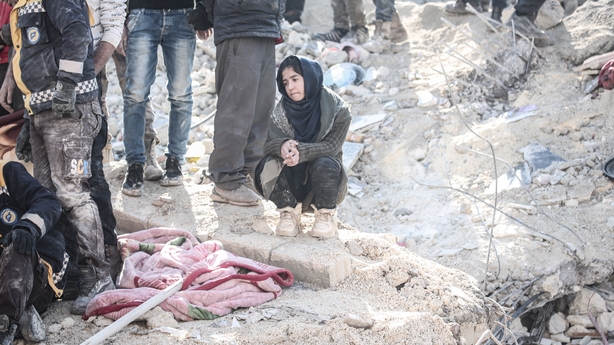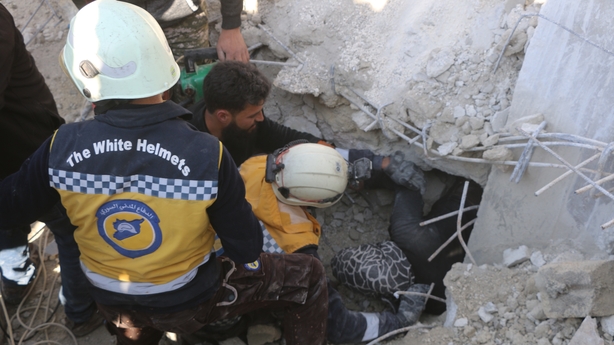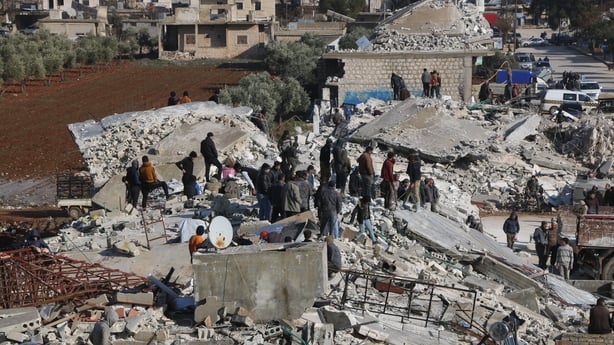After Monday's earthquake brought down his family's building in Syria's battle-scarred second city of Aleppo, Youssef managed to reach one of his trapped relatives by phone, hearing voices despite a bad line.
Since then the 25 year-old has been standing in near-freezing weather by the rubble, unable to get through again.
"I have been waiting for news of my father, my mother, my brother, my sister and her son. Nothing is known about them so far," he said.
"I talked to them and heard their voices, but unfortunately, as you can see here, they're very slow at work and they don't have enough equipment," he said of rescue efforts.
On the streets, men, women and children wrapped in blankets huddled around fires. Many slept in cars and vans parked near where their homes once stood. Others lay on the cold ground.
Aleppo, once famed for its labyrinthine covered souks, medieval minarets, domed bathhouses and imposing ancient citadel, was devastated by years of civil war fighting before the government recaptured a rebel stronghold there in 2016.

It is now among the Syrian cities worst hit by the 7.8magnitude earthquake that has so far killed more than 11,000 people across Turkey and Syria, including 2,500 dead in Syria.
Local authorities said that at least 390 people have died and 750 been injured in Aleppo province, with more than 50 buildings having collapsed.
Many Aleppo buildings had already been weakened by battles during the ongoing 12-year conflict and Youssef's apartment was in Bustan al-Basha, a previously frontline district that was badly smashed up in the fighting.
The quake has also caused further damage to the pride of the city: the towering citadel listed by the UN cultural agency UNESCO as a world heritage site. It had sustained heavy damage during the civil war and the earthquake reduced some of the surviving structures inside it to rubble.
Read More:
Death toll after Turkey, Syria quake continues to rise
Why was the Turkey, Syria earthquake so deadly?
For Aleppo's citizens, still only gradually rebuilding their shattered city years after the fighting there stopped, the earthquake brought new misery.
At al-Razi hospital, 27-year-old Bakr said he was one of only three survivors when his building caved in, killing his parents, a brother and six of his nieces and nephews.
"The building collapsed on top of us," he said, lying injured in a hospital bed.
Rescue workers on both sides of the country's frontlines say more than a decade of war has drained them of resources and they require massive aid and heavy equipment to facilitate search and rescue operations.

Syria's government has received help from a host of Arab countries including Egypt and Iraq, as well as from its key ally Russia, which has sent rescue teams and deployed forces already in Syria to join relief work, including in Aleppo.
Little if any aid has made its way to the rebel-held northwest.
Syria requests EU help for earthquake relief
Syria has made an official plea to the EU for help after the deadly earthquake that struck it and Turkey this week, the bloc's commissioner for crisis management said.
Officials and medics said 8,574 people had died in Turkey and 2,662 in Syria from Monday's 7.8-magnitude tremor.
The European Commission is "encouraging" EU member countries to respond to Syria's request for medical supplies and food, said the commissioner, Janez Lenarcic.
It would also closely monitor the use of any aid given to ensure "it is not diverted" by the sanctioned government in Damascus, he said.
A decade of civil war and Syrian-Russian aerial bombardment had already destroyed hospitals, collapsed the economy and prompted electricity, fuel and water shortages.
The European Union was swift to dispatch rescue teams to Turkey after earthquake.
But it initially offered only minimal assistance to Syria through existing humanitarian programmes, because of EU sanctions imposed since 2011 on the government of President Bashar al-Assad over its brutal crackdown on protesters that spiralled into a civil war.
Nevertheless, it said the door was open for Syria's government to ask for quake assistance.
Now that Damascus has made that move, through the EU's Civil Protection Mechanism that coordinates aid, Mr Lenarcic said the commission was asking European countries "to respond favourably to this request".
The participants in the EU mechanism comprise the 27 EU countries plus eight neighbouring non-EU nations that include Norway and Turkey.
Syria was asking for "a long list of items", Mr Lenarcic said.
"They need assistance in the efforts of their own rescue services in search and rescue of people who are trapped under the rubble. They need many medical items and medicines and medical equipment. They need food items and the like - typical emergency aid items," he said.
"It is also important to ensure - and I would like to underline this - that this assistance goes to people who need it, that it is not diverted. This is something that we will watch," he said.

The EU sanctions on Syria target members of the regime, the military and prominent companies and businesspeople.
The EU commissioner said that "the humanitarian situation in Syria has been bleak for more than a decade and this latest earthquake has only aggravated this already dramatic humanitarian situation".
Mr Lenarcic said that as of Wednesday, 20 EU countries and three associated European nations had offered Turkey a total 1,500 rescue and medical personnel and 100 search-and-rescue dogs to look for quake survivors.

